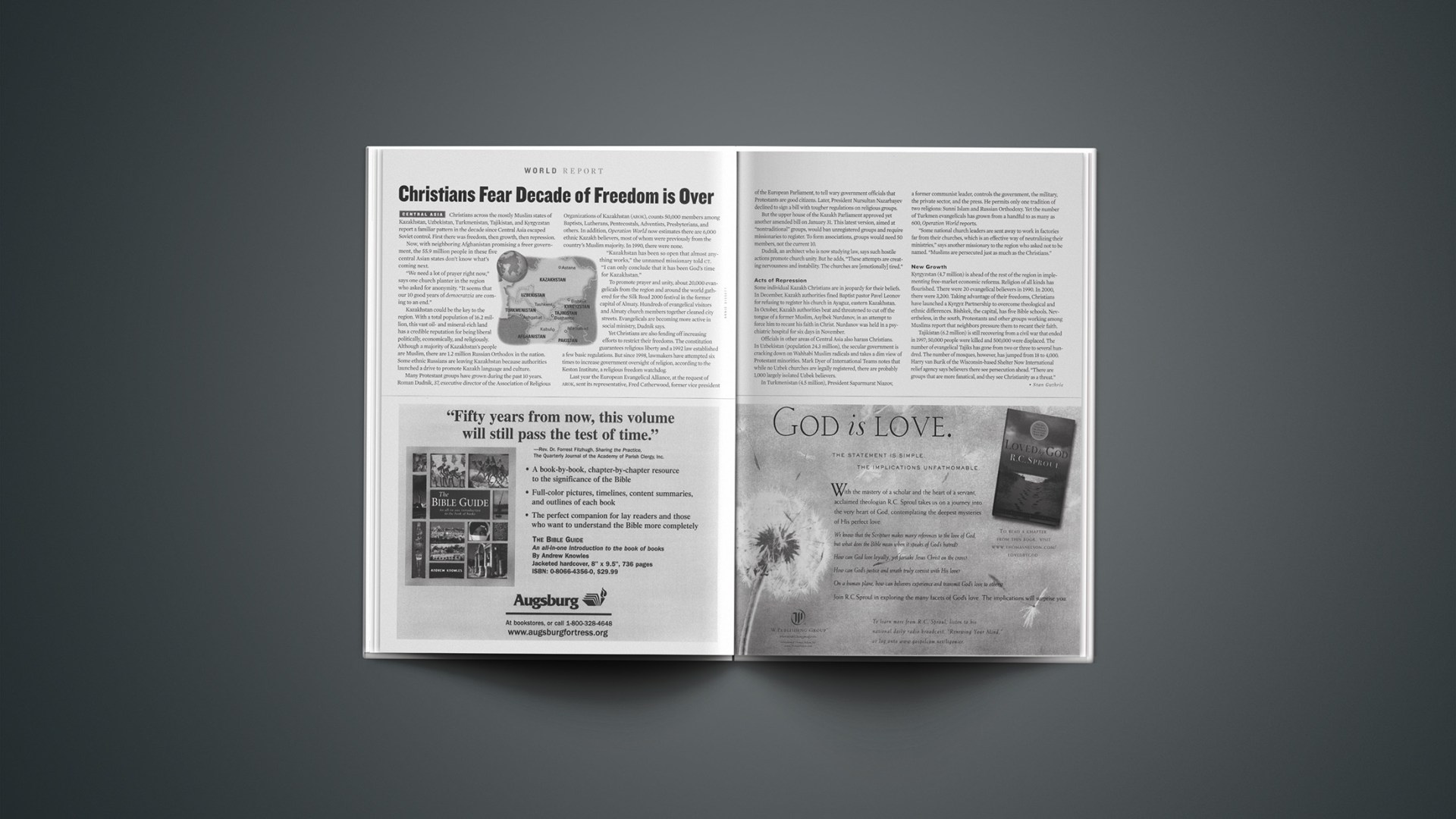Christians across the mostly Muslim states of Kazakhstan, Uzbekistan, Turkmenistan, Tajikistan, and Kyrgyzstan report a familiar pattern in the decade since Central Asia escaped Soviet control. First there was freedom, then growth, then repression.
Now, with neighboring Afghanistan promising a freer government, the 55.9 million people in these five central Asian states dont know whats coming next.
We need a lot of prayer right now, says one church planter in the region who asked for anonymity. It seems that our 10 good years of democratzia are coming to an end.
Kazakhstan could be the key to the region. With a total population of 16.2 million, this vast oil- and mineral-rich land has a credible reputation for being liberal politically, economically, and religiously. Although a majority of Kazakhstans people are Muslim, there are 1.2 million Russian Orthodox in the nation. Some ethnic Russians are leaving Kazakhstan because authorities launched a drive to promote Kazakh language and culture.
Many Protestant groups have grown during the past 10 years. Roman Dudnik, 37, executive director of the Association of Religious Organizations of Kazakhstan (arok), counts 50,000 members among Baptists, Lutherans, Pentecostals, Adventists, Presbyterians, and others. In addition, Operation World now estimates there are 6,000 ethnic Kazakh believers, most of whom were previously from the countrys Muslim majority. In 1990, there were none.
Kazakhstan has been so open that almost anything works, the unnamed missionary told CT. I can only conclude that it has been Gods time for Kazakhstan.
To promote prayer and unity, about 20,000 evangelicals from the region and around the world gathered for the Silk Road 2000 festival in the former capital of Almaty. Hundreds of evangelical visitors and Almaty church members together cleaned city streets. Evangelicals are becoming more active in social ministry, Dudnik says.
Yet Christians are also fending off increasing efforts to restrict their freedoms. The constitution guarantees religious liberty and a 1992 law established a few basic regulations. But since 1998, lawmakers have attempted six times to increase government oversight of religion, according to the Keston Institute, a religious freedom watchdog.
Last year the European Evangelical Alliance, at the request of AROK, sent its representative, Fred Catherwood, former vice president of the European Parliament, to tell wary government officials that Protestants are good citizens. Later, President Nursultan Nazarbayev declined to sign a bill with tougher regulations on religious groups.
But the upper house of the Kazakh Parliament approved yet another amended bill on January 31. This latest version, aimed at nontraditional groups, would ban unregistered groups and require missionaries to register. To form associations, groups would need 50 members, not the current 10.
Dudnik, an architect who is now studying law, says such hostile actions promote church unity. But he adds, These attempts are creating nervousness and instability. The churches are [emotionally] tired.
Acts of Repression
Some individual Kazakh Christians are in jeopardy for their beliefs. In December, Kazakh authorities fined Baptist pastor Pavel Leonov for refusing to register his church in Ayaguz, eastern Kazakhstan. In October, Kazakh authorities beat and threatened to cut off the tongue of a former Muslim, Asylbek Nurdanov, in an attempt to force him to recant his faith in Christ. Nurdanov was held in a psychiatric hospital for six days in November.
Officials in other areas of Central Asia also harass Christians. In Uzbekistan (population 24.3 million), the secular government is cracking down on Wahhabi Muslim radicals and takes a dim view of Protestant minorities. Mark Dyer of International Teams notes that while no Uzbek churches are legally registered, there are probably 1,000 largely isolated Uzbek believers.
In Turkmenistan (4.5 million), President Saparmurat Niazov, a former communist leader, controls the government, the military, the private sector, and the press. He permits only one tradition of two religions: Sunni Islam and Russian Orthodoxy. Yet the number of Turkmen evangelicals has grown from a handful to as many as 600, Operation World reports.
Some national church leaders are sent away to work in factories far from their churches, which is an effective way of neutralizing their ministries, says another missionary to the region who asked not to be named. Muslims are persecuted just as much as the Christians.
New Growth
Kyrgyzstan (4.7 million) is ahead of the rest of the region in implementing free-market economic reforms. Religion of all kinds has flourished. There were 20 evangelical believers in 1990. In 2000, there were 3,200. Taking advantage of their freedoms, Christians have launched a Kyrgyz Partnership to overcome theological and ethnic differences. Bishkek, the capital, has five Bible schools. Nevertheless, in the south, Protestants and other groups working among Muslims report that neighbors pressure them to recant their faith.
Tajikistan (6.2 million) is still recovering from a civil war that ended in 1997; 50,000 people were killed and 500,000 were displaced. The number of evangelical Tajiks has gone from two or three to several hundred. The number of mosques, however, has jumped from 18 to 4,000. Harry van Burik of the Wisconsin-based Shelter Now International relief agency says believers there see persecution ahead. There are groups that are more fanatical, and they see Christianity as a threat.
Copyright © 2002 Christianity Today. Click for reprint information.
Related Elsewhere
International Christian Concern has persecution profiles for Kazakhstan, Uzbekistan, Turkmenistan, Tajikistan, and Kyrgyzstan.
The state departments 2001 International Religious Freedom Report has information on rights in Kazakhstan, Uzbekistan, Turkmenistan, Tajikistan, and Kyrgyzstan.
In November, Keston News Service reported on the beating of Asylbek Nurdanov in Kazakhstan.
Christianity TodaysWorld Report has more news articles on Uzbekistan, Turkmenistan, and Tajikistan.










